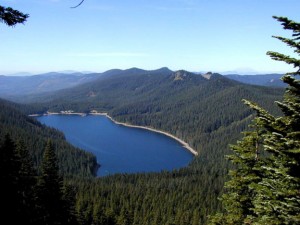It rains one-hundred-fifty days a year in Portland, Oregon. With all that water, why do we need to protect it?
If you’ve lived in the I-5 corridor for any length of time, then you’ve likely heard about the high quality water many of us get from the Bull Run Watershed. The picture even makes it look beautiful.
But Bull Run is only one source of fresh water in the Willamette Valley and it’s also a long distance away for us to personally try to protect.  So we have to look for practical and closer to home water issues we can help with.
And on this Earth Day 2011, I asked Karen DeBaker of Clean Water Services to let us know what we should be doing to protect our water–and why. It’s part of my ongoing series of Friday interviews.
It seems like it rains forever around here in the spring. So why should we worry about conserving water in the northwest?
 Water needs to be conserved and protected no matter where you live in the world. Even though it rains a lot in the northwest, water is a finite resource and used many times over and over…it moves from the rain to the river to your faucet at home. Did you know that we’re using the same water dinosaurs used millions of years ago? Only 1% of the earth’s water is fresh and clean for us to use for our daily activities. Since we use the same water over and over again, you have to think about how it travels. When it rains, runoff carries with it oil, soap, fertilizers and pet waste as it moves into the storm drain and eventually into your local river and stream.
Are there three fairly simple things we can do on Earth Day weekend to make this a better place, water-wise?
Yes! 1) Plant natives. They use less water and don’t need chemicals to survive. 2) Can the wipes. Wipes, rags and towelettes that are flushed down the toilet lead to clogged pipes, messy sewer backups and expensive repairs. So make sure you throw all cleaning materials in the trash. 3) Fix water leaks. Contact your local water and sewer utilities for free leak tests.
I’ve heard alot about building rain gardens in your backyard. Why is this better than, say, more grass or just plain barkdust like so many of us have?
Rain gardens slow the water down as it filters through native plants that naturally capture pollutants from our runoff. Rain gardens may not be suitable for every type of yard, so contact your local water and sewer utility for free technical assistance.
Is there anything else you want to say?
Remember, what goes on the ground goes into our rivers and streams.
For more tips on how you can help and great coupons to make it cheaper to do so, visit this Koin Local 6 web page that’s part of our “Do the right thing” campaign.
Happy Earth Day!


Bruce,
Thank you for elevating this important topic into public dialogue. Blog readers, the City of Gresham is offering $200 reimbursement grants for residents who build rain gardens. Our spring grants are nearing the deadline, but we’ll be offering them again in the fall.
Find out more here: http://www.greshamoregon.gov
Wow, that’s quite a deal. Thanks for letting everyone know!